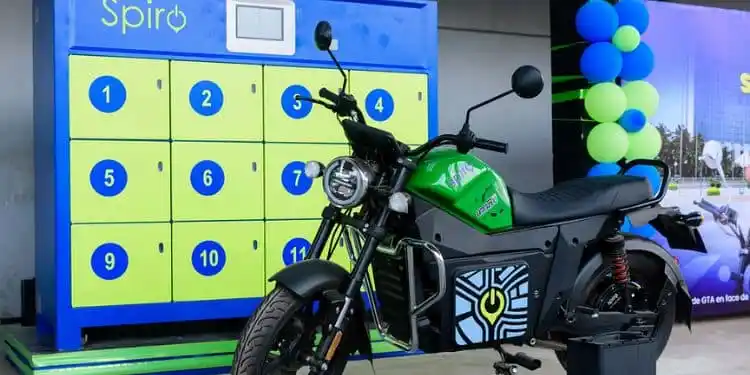In many African cities, motorcycle taxis—known as boda-bodas, okadas, or zemidjans—are not just a mode of transport. They are an economic lifeline, a last-mile solution, and an informal industry employing millions. But they are also heavily polluting, fuel-dependent, and often precariously financed.
Spiro, an e-mobility startup founded in 2022 and headquartered in Togo, is changing that narrative—by building Africa’s largest network of electric two-wheelers and battery-swapping stations.
With operations spanning Benin, Rwanda, Togo, and Kenya, Spiro is replacing noisy petrol bikes with silent, smart, zero-emission motorcycles—and offering a new model of urban mobility that is green, affordable, and operator-friendly.
Name: Spiro
Founded: 2022 (formerly known as M Auto)
Headquarters: Lomé, Togo
Core Offering: Electric motorcycles + battery swapping infrastructure
Vehicles Deployed: 10,000+ (as of 2025)
Battery Swap Stations: 350+
Target Users: Commercial riders, delivery services, urban fleet operators
Business Model: Lease-to-own & subscription-based access
Backers: African Transformation Fund, private equity, development partners
Markets: Togo, Benin, Rwanda, Kenya—with plans to expand into Nigeria and Uganda
Rather than wait for Africa’s charging infrastructure to catch up, Spiro has built its model around battery swapping—allowing riders to exchange depleted batteries for fully charged ones in under two minutes at dedicated stations.
This approach eliminates range anxiety, reduces downtime, and increases earning potential for commercial riders. It also keeps upfront costs low, since Spiro owns and maintains the batteries, while riders lease the bikes via monthly payments or usage-based pricing.
With swap stations placed across cities and transit hubs, Spiro offers the infrastructure backbone for a scalable, reliable e-mobility ecosystem.
Green Mobility That Pays
Spiro’s value proposition goes beyond environmental benefits. Its electric motorcycles are cheaper to operate, require less maintenance, and insulate riders from volatile fuel prices.
For drivers—many of whom are informal workers earning less than $5 a day—this translates to better margins, predictable costs, and asset ownership within 18–24 months.
For governments, Spiro supports national goals around decarbonization, import substitution, and clean job creation—offering a public-private model that fits into larger transport and energy agendas.
Smart Vehicles, Smart Platform
Spiro’s bikes aren’t just electric—they’re connected.
Each vehicle comes equipped with IoT tracking, geofencing, telemetry data, and fleet management software. Riders and fleet operators can track mileage, monitor battery health, and plan optimal routes—all from a smartphone app.
This digital layer transforms Spiro from a bike provider into a mobility-as-a-service platform, capable of serving everything from logistics fleets and food delivery to municipal services and informal ride-hailing.
What the Industry Can Learn
Spiro’s rapid expansion offers powerful lessons for mobility innovators, clean tech investors, and urban planners:
-
Battery swapping solves real infrastructure gaps. It’s faster and more practical than fixed charging stations—especially in dense, informal cities.
-
Affordability drives adoption. Riders care about cost savings first—climate impact is a bonus.
-
Financing is part of infrastructure. Lease-to-own models unlock access for low-income earners.
-
Green jobs can scale. Spiro is training technicians, station operators, and logistics managers across its network.
-
Data is a competitive edge. Telemetry and usage analytics create new business lines, from insurance to maintenance scheduling.
The Road Ahead
With plans to deploy over 100,000 electric bikes by 2027 and expand into major cities like Lagos, Nairobi, and Abidjan, Spiro is positioning itself as the continent’s leading EV two-wheeler operator.
The company is also exploring carbon financing, public fleet partnerships, and localized battery manufacturing to reduce costs and increase local value creation.
Its long-term vision is clear: replace every petrol-powered motorcycle in Africa’s cities with a cleaner, smarter alternative—and build the infrastructure to support it.
About the Author
Aurel Kinimbaga is a contributor specializing in innovation, inclusive growth, and business strategy across African markets. He writes regularly on entrepreneurship, digital infrastructure, and the economic forces shaping the continent’s future.
